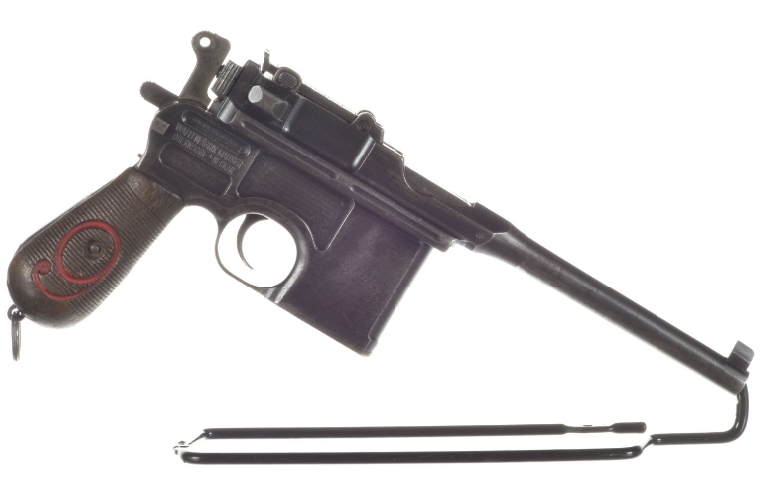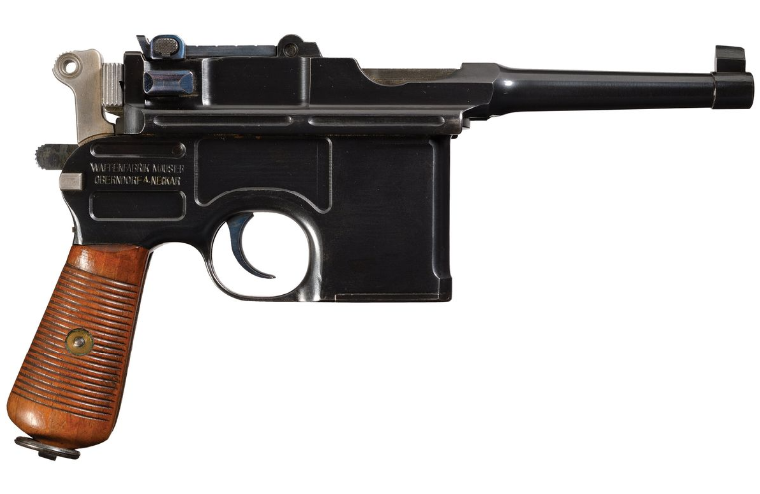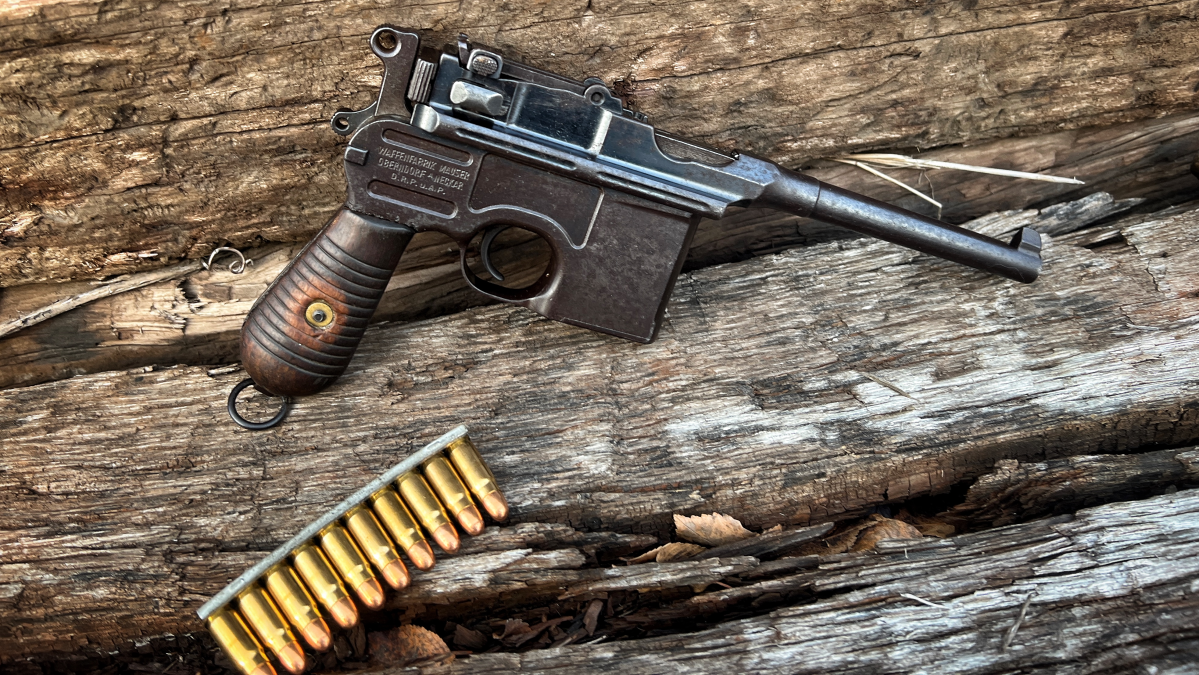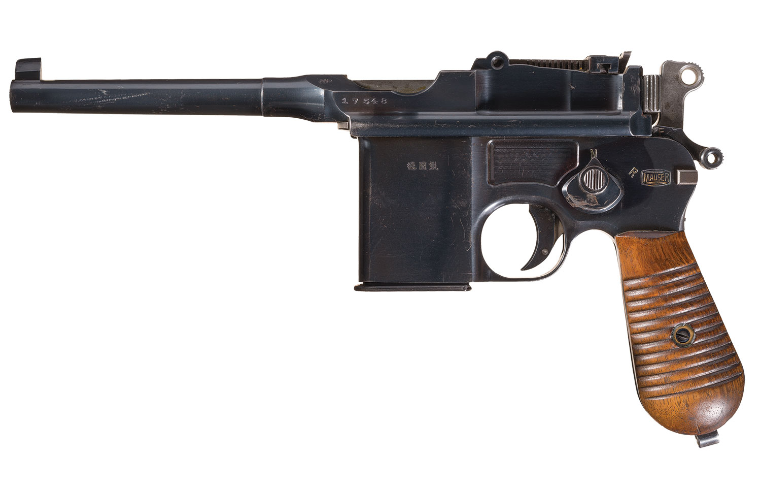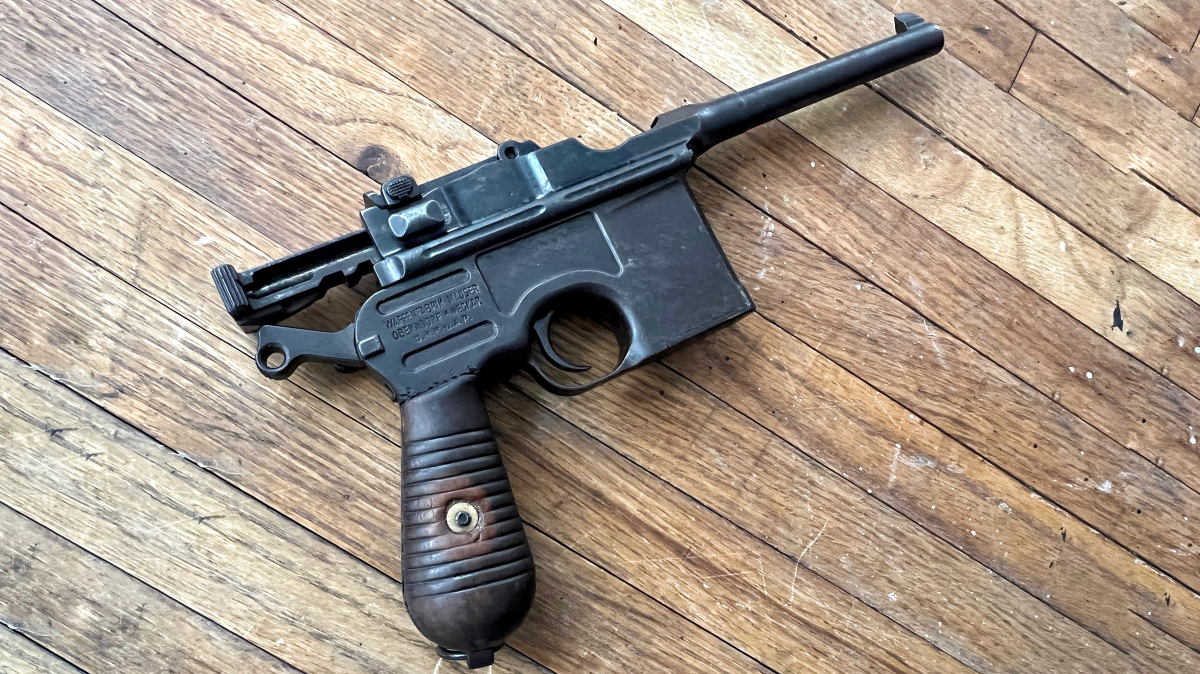Curious Relics #057: Variations Continued – The Mauser C96 Part Three
Sam.S 02.08.23

Welcome, if you are a newcomer to this fun bi-weekly segment of AllOutdoor.com! Last time we continued our crusade on reporting the facts of the Mauser C96 and its variations. Well, that article ran very long, so we split it in two. This is part two of the last one, but part three overall. In the last article, I covered the start of the list of variations of the iconic Mauser C96 “Broomhandle” pistol. This time I plan to continue on where we left off starting with what is considered an “actual variation.” I have so much admiration for the Mauser Construktion 96 and all of its oddities and quirks. Let’s dive right into the legendary Broomhandle!
Recent Curious Relics Coverage:
- Curious Relics #056: A Legend is Born – The Mauser C96 Part Two
- Curious Relics #055: A Personal Favorite – The Mauser C96 (Part One)
- Curious Relics #054: All I Want For Christmas – Curious Relics Edition
- Curious Relics #053: Bang, Bang, Ping! – The M1 Garand Part III
- Curious Relics #052: Same Skeleton, Different Muscle – The M1 Garand
- Curious Relics #051: Almost a Different Caliber – The M1 Garand
Note: Much of this article was greatly aided by a book by Mauro Baudino and Gerben van Vlimmeren. This book is an excellent source of specific information on the Mauser company, its products, and its people. The book is called Paul Mauser His Life, Company, and Handgun Development 1838-1914. In the future, I will do a full review. Go check it out!
Welcome to our recurring series of “Curious Relics.” Here, we want to share all of our experiences, knowledge, misadventures, and passion for older firearms that one might categorize as a Curio & Relic – any firearm that is at least 50 years old according to the ATF. Hopefully along the way you can garner a greater appreciation for older firearms like we do, and simultaneously you can teach us things as well through sharing your own expertise and thoughts in the Comments. Understanding the firearms of old, their importance, and their development which lead to many of the arms we now cherish today is incredibly fascinating and we hope you enjoy what we have to share, too!
Variations Continued: The Mauser C96
Kicking things off with a little disclaimer. There were dozens of variations of the C96 in its lifetime and even after. There were military contracts, clones, modifications, etc. This list of variations will be composed of what I would consider a mix of Major notable variations and also some cooler and rarer ones. Some will include and exclude certain milling operations, safety types, and hammer styles. Please understand there is so much more out there.
The “Actual” Variations Continued:
- 9mm Export C96: These pistols popped up in 1900 and were paired with a new Mauser cartridge; the 9mm Export cartridge. 9mm Mauser Export or 9x25mm was produced in a bid for a cartridge that was more powerful than that of the 7.63 Mauser and 9×19 Luger. Military trials were coming up and a prominent opponent was the 9mm Luger pistol and its 9mm cartridge. Only around 150 of these pistols would pop up between 1900 and 1930. The cartridge was far more successful than the C96 guns chambered for it which were considered too powerful for what they were intended.
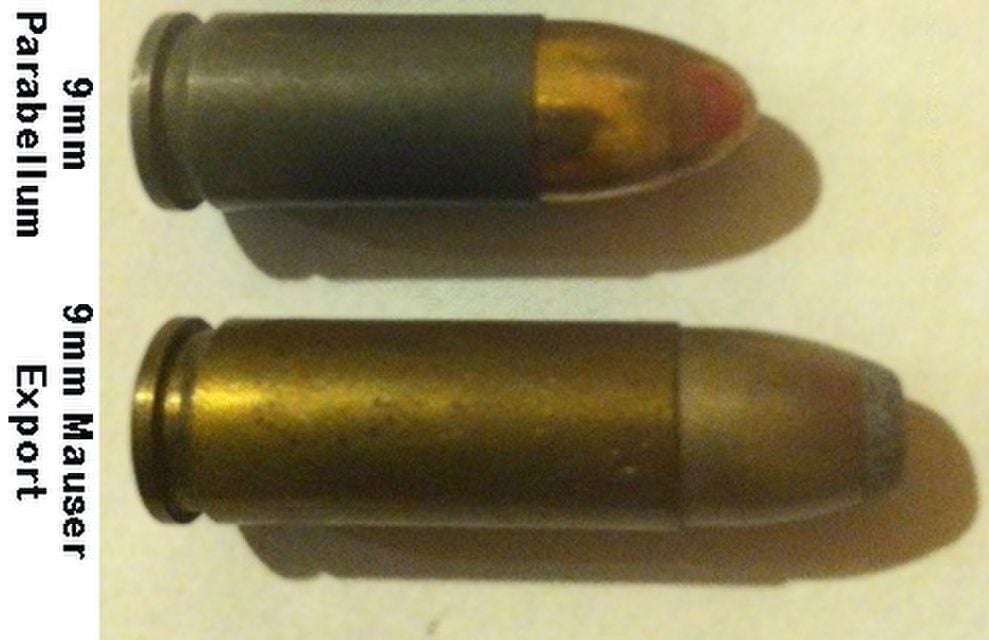
- Red 9 C96: This was a German military contract C96 during the war of attrition that was World War One. The biggest notable changes were that they were chambered for 9mm Parabellum (Luger, 9×19, etc) and had the adjusted sight ranges to go with the cartridge (50 meters to 500 meters). The famous “Red 9” C96 pistols were allegedly made from 1916 and into 1918 with production numbers estimated at 150,000. I said “allegedly” because more recent information says that only around 95,000 had been produced by the end of World War One (1918) and production actually continued into the very early 1920s (roughly 1924). The well-known and obvious distinctive feature of the Red 9 C96 is, well, the large red “9” on the broom handle grips. This was done to ideally prevent any cartridge confusion in World War One battlefields where standard 30 Mauser C96 pistols were already in use.
Lot 4367: Mauser Broomhandle “Red 9” Semi-Automatic Pistol with Holster. (n.d.). Rock Island Auction Company. photograph. Retrieved January 3, 2023, from https://www.rockislandauction.com/detail/1039/4367/mauser-broomhandle-red-9-semiautomatic-pistol-with-holster.
- M1920/M1921/BOLO Mauser C96: I lumped the three of these together since they sort of intertwine. Basically, after World War One ended and the Treaty of Versailles was signed in 1919, Germany had certain limitations put on it as far as small arms manufacturing goes. To drastically simplify, they were not allowed to produce handguns with barrels exceeding 4″ and cartridges 9mm or larger. This left Mauser with their hands tied but with an easier workaround of shortening the barrels to 3.9″ and using the old faithful 7.63 Mauser cartridge. These unexpectedly found a lot of popularity due to their now increased concealability and lightweight nature. Prewar government-owned C96 pistols had to be modified with shorter barrels from older luger barrels that were chambered for 7.65 Luger (30 Luger).
Note: “Pre-war” BOLO pistols did exist since barrel lengths could often be adjusted according to batch orders. It is widely accepted that the “Bolo” term is derived from its popularity with the Russian Bolsheviks.
Lot 1374: Post-Wwi Mauser C96 Bolo Commercial Broomhandle Pistol – Excellent Post-World War I Mauser C96 Bolo Commercial Broomhandle Pistol. (n.d.). Rock Island Auction Company. photograph. Retrieved January 25, 2023, from https://www.rockislandauction.com/detail/87/1374/postwwi-mauser-c96-bolo-commercial-broomhandle-pistol.
- M1930 Mauser: The Mauser M1930 (M30 for short) is thought of as an improved and simplified C96 where some machining measures were simplified. They all have longer barrels 5.2″ to 5.5″ and large “pre-war” grips. My Mauser C96 is what is often referred to as the M1930 variant. It is amongst the last of them ever made full-scale. My personal one is an earlier M1930 (probably around 1932-1933). They are known for being a high polish blue and having small arts nitre blued (strawed). These Mauser pistols were the last of the standard C96 pistols to see production that ceased in 1934. There were very rare instances of M30s having removable magazines.
- M1932/M712 Schnellfeuer: A select fire Mauser C96 that was designed by Josef Nickl. These used a detachable magazine and were most likely a result of competing clones popping up in Spain in the late 1920s. They are unofficially referred to as the M1932 since they were in full-scale production from 1932 until 1936 but would later be called the M712 Schnellfeuer by the German Wehrmacht during World War II.
Lot 1515: Mauser 1932 Schnellfeuer Pistol Machine gun 7.65 mm Mauser. (n.d.). Rock Island Auction Company. photograph. Retrieved January 12, 2022, from https://www.rockislandauction.com/detail/66/1515/mauser-1932-schnellfeuer-pistol-machine-gun-765-mm-mauser.
Honorable Mentions:
- M1917 Mauser Trench Carbine: A literal trench carbine that was requested by the German government during World War One. It was to be in 9mm and featured a 40-round extended magazine. Very few were produced.
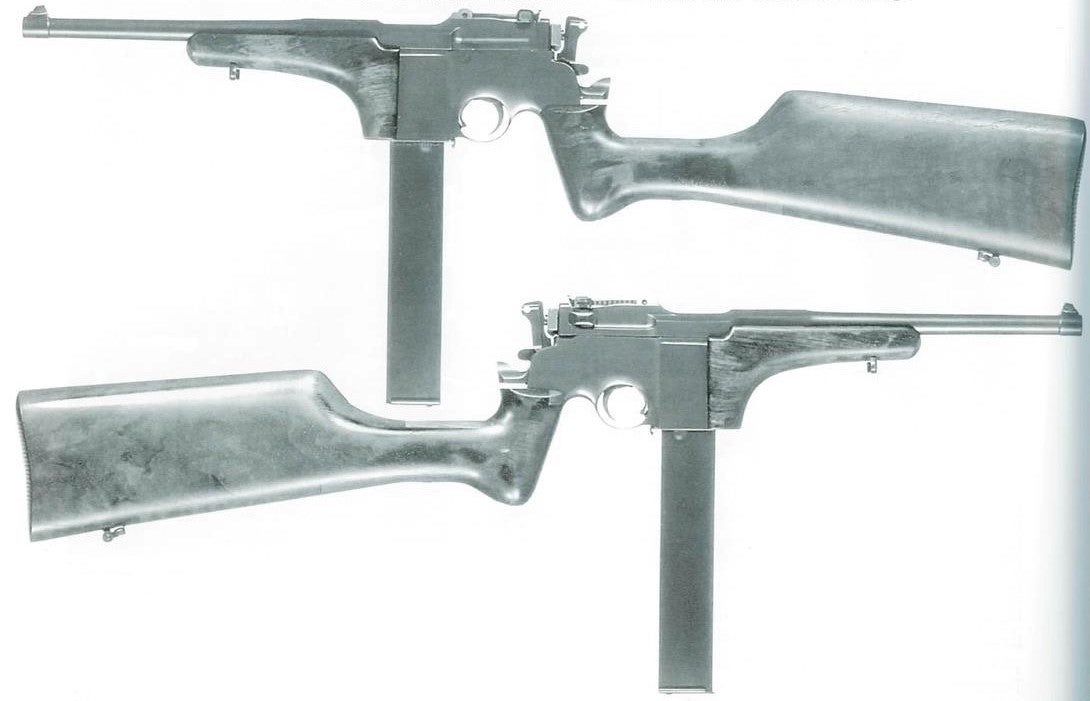
- PASAM: In the 1960s Brazil modified existing M1932/M712 Schnellfeuer pistols to have different stocks and even vertical foregrips.
- Astra Model 900 / 901 / 902 / 903: Spanish made copies of the C96 which started around 1927 and would be produced in varying numbers until 1941. Internally they have differences from true C96 pistols. Spoiler…they have a bunch of pinned parts.
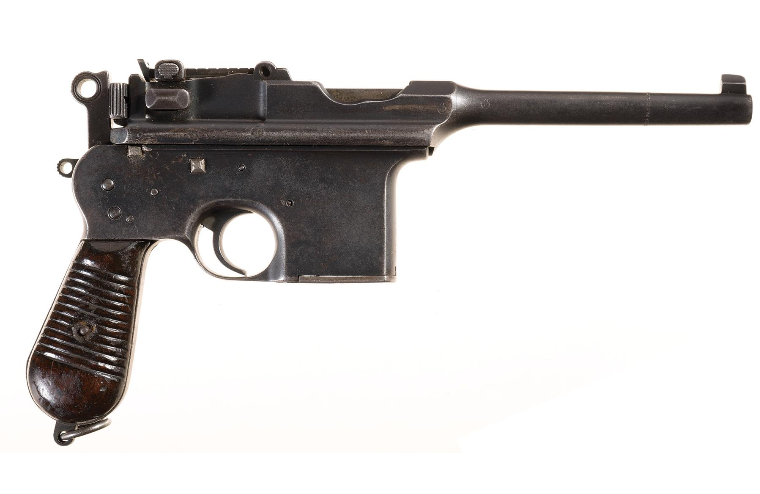
Lot 4478: Astra Model 900 Broomhandle Semi-Automatic Pistol. (n.d.). Rock Island Auction Company. photograph. Retrieved January 25, 2023, from https://www.rockislandauction.com/detail/1029/4478/astra-model-900-broomhandle-semiautomatic-pistol.
- Shanxi Type 17: Made from 1928 to 1931 this powerhouse of a Chinese C96 copy was chambered for 45 ACP. This era in Chinese history sees a lot of troops being equipped with Thompson Machine gun copies so in order to limit supply chain issues it was decided to produce a popular pistol design in 45 ACP.
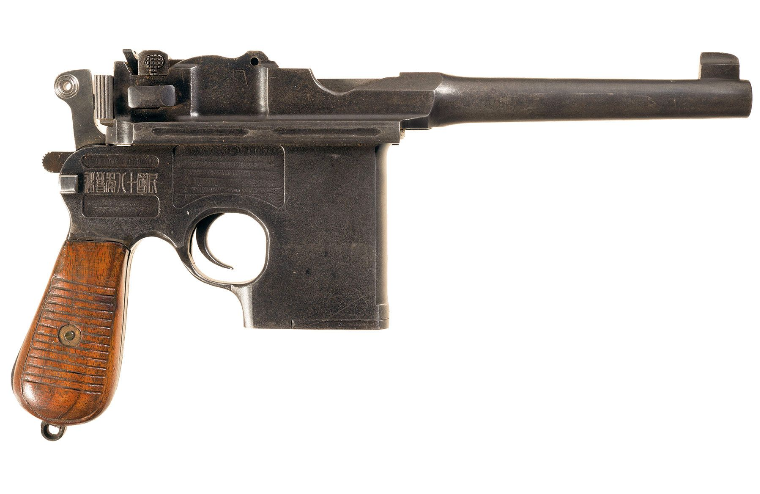
Lot 4754: Chinese Shansei Arsenal C96 Broomhandle Semi-Automatic Pistol – Chinese “Shansei Arsenal” C96 Broomhandle Semi-Automatic Pistol with Stock and Shoulder Holster. (n.d.). Rock Island Auction Company. photograph. Retrieved January 25, 2023, from https://www.rockislandauction.com/detail/1030/4754/chinese-shansei-arsenal-c96-broomhandle-semiautomatic-pistol.
End of Part Three: The Mauser C96
This one concludes the wide world of the Mauser C96 variations. There were several military contracts and orders of the C96 (Italy, Norway, Germany, and even Mexico) all of which have small differences that really reflect positively on the Mauser company as a whole. They constantly innovated, changed, and applied wants and needs to their orders of small arms. Paul Mauser put it best when he said “When something can no longer be improved, it is obsolete”. Thank you all for sticking with me through this long haul of an article and a big thank you to Mauro Baudino for getting in touch with me and helping me secure a review copy of his book which will be featured in its own article later on. See you folks next time!
In closing, I hope our Curious Relics segment informed as well as entertained. This all was written in hopes of continued firearm appreciation and preservation. We did not just realize how guns were supposed to look and function. It was a long and tedious process that has shaped the world we live in. So, I put it to you! Is there a firearm out there that you feel does not get much notoriety? What should our next Curious Relics topic cover? As always, let us know all of your thoughts in the Comments below! We always appreciate your feedback.
